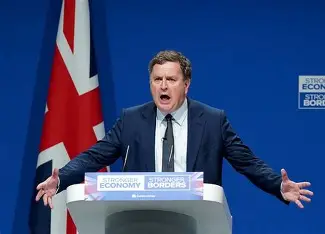London, October 6, 2025 — The Conservative Party has announced a major economic proposal to abolish business rates for high street shops and pubs in a bid to revive local economies and boost small businesses ahead of the upcoming general election.
Prime Minister Rishi Sunak unveiled the plan during a campaign event in Birmingham, calling it a “bold move to restore Britain’s high streets and bring back the local spirit of commerce.” The proposal, which would replace business rates with a “fairer, modernized commercial property tax,” aims to relieve financial pressure on thousands of small business owners struggling with high operating costs.
“High streets are the beating heart of our towns and communities,” Sunak said. “By scrapping business rates for small shops and pubs, we are giving entrepreneurs the breathing space they need to grow, create jobs, and serve their local communities.”
Under the plan, the new tax system would be based on a combination of property value and company revenue, ensuring that large online retailers and multinational chains pay a greater share than small independent businesses. Treasury officials estimate that the policy could cost the government about £8 billion annually but say it will be partly offset by higher levies on digital and warehouse-based companies.
The announcement comes at a time when Britain’s high streets continue to suffer from the effects of the pandemic, inflation, and rising energy bills. Many small business owners have long complained that business rates are outdated and disproportionately burden brick-and-mortar shops compared to online competitors.
Labour leader Keir Starmer dismissed the Conservative proposal as “an election gimmick,” arguing that the government had years to reform the system but failed to act until now. “The Tories have overseen the collapse of hundreds of local businesses,” Starmer said during a speech in Manchester. “A last-minute promise won’t erase their record of neglect.”
Meanwhile, the Federation of Small Businesses welcomed the proposal but urged the government to clarify how it plans to fund the change without cutting essential public services. “Abolishing business rates would be transformative for small firms,” said FSB Chair Martin McTague. “But the details matter. We need a fair system that doesn’t punish success or pile new costs elsewhere.”
Retail analysts say the move could prove politically effective, appealing to voters in towns that have seen decades of decline in local shopping districts. “This is a strategic play to win back traditional Conservative strongholds,” said political economist Dr. Amelia Grant of the London School of Economics. “High streets have symbolic importance, and promising to revive them resonates emotionally with many communities.”
According to government data, more than 45,000 pubs and 200,000 small retail outlets currently pay business rates across the United Kingdom. Many of them have struggled to stay afloat amid declining foot traffic and competition from online platforms such as Amazon.
The Treasury confirmed that consultations on the new system would begin in November, with the aim of introducing legislation in early 2026 if the Conservatives remain in power. Local councils would continue to receive funding through a new allocation formula tied to business performance and local economic activity.
Critics have warned that the transition could be complicated, with concerns about how to accurately assess digital sales and multi-use properties. However, the government insists that technology-based tax assessment tools will make the process transparent and efficient.
As the general election approaches, economic policy has become a central battleground between the major parties. The Conservatives are framing their business rate reform as a cornerstone of their “Plan for Prosperity,” while Labour has focused on public sector investment and a green industrial strategy.
Public reaction to the announcement has been mixed. Some small business owners have expressed cautious optimism, while others question whether the pledge will materialize. “We’ve heard promises like this before,” said Sarah Ellis, owner of a small pub in Nottingham. “If it happens, it could save my business. But I’ll believe it when I see it.”
The pledge marks one of the most significant Conservative policy announcements of the 2025 campaign so far and sets the stage for a heated debate over the future of Britain’s local economies.



